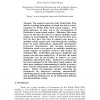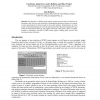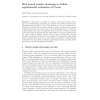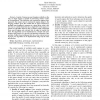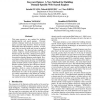WEBNET
1996
14 years 5 months ago
1996
: The explosive growth of the World Wide Web, and the resulting information overload, has led to a miniexplosion in World Wide Web search engines. This mini-explosion, in turn, led...
WEBNET
1998
14 years 5 months ago
1998
: User interfaces to WWW search engines typically present results as ranked lists of documents. Such lists give users little help in understanding document variation: we propose a ...
ECIS
2000
14 years 5 months ago
2000
Abstract-The information era has brought with it the wellknown problem of 'Information Explosion'. There are many and varied search engines on the Internet but it is stil...
ACL
1998
14 years 5 months ago
1998
A layered approach to information retrieval permits the inclusion of multiple search engines as well as multiple databases, with a natural language layer to convert English querie...
IIS
2003
14 years 5 months ago
2003
Abstract. In this paper we consider the problem of web search results clustering in the Polish language, supporting our analysis with results acquired from an experimental system n...
IC
2003
14 years 5 months ago
2003
—In spite of numerous search engines available on the web, no single engine is capable of performing “better” under all circumstances. This being the case, metasearch engines...
IADIS
2003
14 years 5 months ago
2003
This paper describes/represents an approach to the design of an information retrieval of providing an search of users. The Next generation of information systems will rely on coll...
NIPS
2001
14 years 5 months ago
2001
The PageRank algorithm, used in the Google search engine, greatly improves the results of Web search by taking into account the link structure of the Web. PageRank assigns to a pa...
IADIS
2003
14 years 5 months ago
2003
Indexing quality has an overwhelming effect on retrieval effectiveness of search engines. In the past few years it has become one of the major challenges in the search engines are...
IJCAI
2001
14 years 5 months ago
2001
This paper presents a new method for building domain-specific web search engines. Previous methods eliminate irrelevant documents from the pages accessed using heuristics based on...
